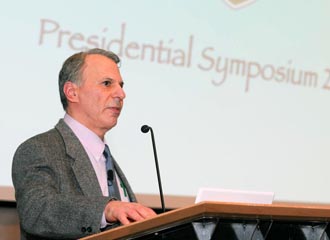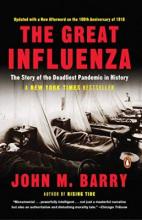John Barry
Adjunct faculty

Areas of Expertise
Biography
John Barry, author of The Great Influenza: The Story of the Deadliest Pandemic in History, can speak to the coronavirus and how it compares to seasonal and pandemic viruses seen in past years. His research focuses on how viruses spread, what causes them to become pandemics and what can be done to control deadly infections.
Barry is an American author and historian who has written books on the Great Mississippi Flood of 1927, the influenza pandemic of 1918, and the development of the modern form of the ideas of separation of church and state and individual liberty. He is a Distinguished Scholar and adjunct faculty at Tulane University.
Education
Brown University
Links
Media Appearances
Coronavirus Crisis: Why self-isolation and social distancing failed for Spanish Flu
The majority of deaths happened to young people, according to John M Barry, author of ‘The Great Influenza: The Epic Story of the Deadliest Plague in History’ He told Express.co.uk: “The peak age for death was 28 and the elderly escaped almost entirely. Well over 90 percent of excess mortality was people under 65.
Lessons from 1918
Our guests are John Barry, professor of public health at Tulane University and author of The Great Influenza, and University of Pennsylvania nursing historian, Pat D'Antonio. But first, we’re going to hear about President Trump’s shift in coronavirus messaging in recent days when we speak to the Washington Post’s Philip Bump.
U.S.-China media war on truth and trust
John Barry, a professor at the Tulane University School of Public Health and Tropical Medicine, writes that the most important lesson from the 1918 Spanish flu outbreak that killed millions of people is “tell the truth. Without it, trust in authority disintegrates, society began fraying. …” Japan’s special strength is its social resilience but even that has limits. A crisis is not the time to discover that the reservoir of trust and goodwill has dried up.
John Barry, author of Great Influenza bestseller, says coronavirus will be very, very bad
“I think this is going to be very, very bad,” Barry said. “This is not a strain of influenza, so nobody in the world has immunity to anything like it. Nobody in the world has seen it before. So it certainly has the potential to spread very, very widely.”
President Trump’s coronavirus media criticism is misplaced » Ben Carson doesn’t have any answers for George Stephanopoulos
Tulane University professor John Barry, who has written extensively about the 1918 flu, said, “I think more people will die, yeah. Clearly that was the case in 1918. People can deal with the truth. It’s the unknown that’s much scarier.”
The 1918 flu pandemic, a cautionary tale
"That's equivalent to 225 to 450 million people today," said John Barry, who wrote a history of the 1918 flu and is on the adjunct faculty of Tulane University. "The numbers are staggering.
Can this virus be contained? Probably not.
John M. Barry is the author of “The Great Influenza: The Story of the Deadliest Pandemic in History” and adjunct faculty at the Tulane University School of Public Health and Tropical Medicine.
Tulane Today Mentions
In the News
Washington Times: History As It Happens: Heading toward herd immunity
Washington Post: Opinion: Herd immunity is almost here. But what does that mean?
CNN: Exclusive: Intel agencies scour reams of genetic data from Wuhan lab in Covid origins hunt
Washington Examiner: If you don’t accept the vaccine, you are still endangering everyone else
Washington Post: Opinion: The 1918 pandemic tells us that we can’t celebrate the end of covid yet
Healio: The Great Influenza author: 'Nobody' in public health foresaw politicization of COVID-19
New York Times: When Can I Be a House Guest Again?
Washington Post: Opinion: The coronavirus is mutating. Will our vaccines keep up?
Science News: What will life be like after the coronavirus pandemic ends?



